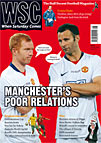 The plans to restructure the Welsh Premier league have been met with an equal amount of support and opposition, as Paul Ashley-Jones reports
The plans to restructure the Welsh Premier league have been met with an equal amount of support and opposition, as Paul Ashley-Jones reports
In May the Football Association of Wales (FAW) published plans to restructure the Welsh Premier (WP). The move, the greatest change in Welsh domestic football since the WP (previously the League of Wales) was created in 1992, proposed a cut from 18 teams down to ten by the end of next season. This plan didn’t come as a shock and had been endorsed by the clubs themselves some time ago. What did surprise them was that the FAW rejected a ten-club second division.